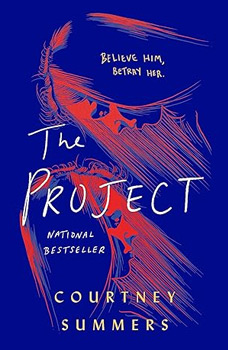Summary | Excerpt | Reviews | Beyond the book | Read-Alikes | Genres & Themes | Author Bio

Jasmine and Chelsea are about to enter their junior year at New York City's progressive Amsterdam Heights Collaborative Community School. However, not long after the year starts, the girls find themselves stifled by their supposedly forward-thinking extra-curricular clubs. Chelsea, who aspires to be a poet, wants to write and read about contemporary social problems, the stuff that matters to her—body image, gender roles, workplace discrimination, media portrayals of women—but Poets for Peace and Justice is stuck in the 19th century. Jasmine, who adores theater, dreams up dynamic, powerful characters, but the August William Acting Ensemble pigeonholes her into the same old flat, stereotypical roles for large black women.
Aggrieved but not resigned, the girls start their own club, a space to create work that supports women's ideas. They call it Write Like a Girl. Accompanying the club is a school-sanctioned blog where they share their thoughts and experiences. To their elation, the blog goes viral, resonating with students—especially girls—from Amsterdam Heights and beyond. But the positive attention comes at a cost. Chelsea and Jasmine are bullied, both online and at school, for calling attention to controversial issues. The principal accuses the girls of instigating these conflicts, so he threatens to shut down their club and silence their voices, launching their mission to save Write Like a Girl by the end of the year.
One of the things I enjoyed most about Watch Us Rise is that the characters are bright, dynamic and complex. Sometimes, novels that tell the stories of diverse characters do a disservice to those voices by compressing their nuances. For example, minority characters may be portrayed as a monolith, as in all people who belong to a certain group think and behave in the same way. Or, minority characters are reduced to one side of themselves—the black friend who exists only in relation to other characters, having no backstory or plotline of their own. Watch Us Rise avoids those pitfalls in a few ways.
Firstly, this book is co-written by Renee Watson and Ellen Hagan, two writers—and artists and activist themselves—who are in some different, and some overlapping, marginalized groups. For instance, Renee Watson is black, whereas Ellen Hagan is white, but they are both women. Therefore, they are able to approach this dual narrative from points of view that are unique, making the voices of Jasmine and Chelsea—who are also simultaneously similar and different in their marginalization—thoughtful and authentic.
Another factor that facilitates the development of diverse, multifaceted characters is the style of the novel. The primary narrative is told through chapters that alternate between the voices of Jasmine and Chelsea in standard narrative form. However, multimedia elements scattered throughout the text allow for the incorporation of new voices. Blog posts, comment sections, essays, poems, quotes, text messages, forms, posters, emails, and art are integrated into the chapters. This allows the characters to take on voices ranging from formal to informal, from private to public.
Some of this interjected media comes from other characters, allowing the novel to give insight into perspectives beyond the two protagonists. For instance, the experiences and points-of-view of Jasmine and Chelsea's two best friends, Nadine and Isaac, are also explored, as Nadine curates a playlist for Write Like a Girl and Isaac sketches t-shirt designs for the club. The contrasting of characters' perspectives comes into focus when experiences such as weight-based conflicts and colorism—prejudice or discrimination against people with darker skin tone, often within racial or ethnic groups—are common for some characters, but completely unnoticed by others. This storytelling style promotes an impressively thorough examination of young peoples' voices, coming from different races, ethnicities, sizes, incomes and abilities.
Ultimately, this is the type of book that I wish was available when I was in middle school and high school. It introduces topics that are relevant to all people but are often difficult to grasp. What does it mean to be a feminist? To what extent are racism, sexism, colorism and other -isms present and preventable in society? How do we build an intersectional community of voices where everyone is welcome? How can young people connect with meaningful mentors and community organizations, and how do they handle increasingly arduous facets of life, such as grief, loss and romance? Jasmine and Chelsea do not uncover the answers to all of these big questions, but they do learn what it means to rise.
For more information on Renée Watson and Ellen Hagan, check out their interview with School Library Journal.
![]() This review was originally published in The BookBrowse Review in February 2019, and has been updated for the
February 2020 edition.
Click here to go to this issue.
This review was originally published in The BookBrowse Review in February 2019, and has been updated for the
February 2020 edition.
Click here to go to this issue.

If you liked Watch Us Rise, try these:

by Louisa Onome
Published 2024
Fans of Netflix's On My Block and readers of Elizabeth Acevedo and Angie Thomas will love this debut novel about a girl whose life is turned upside down after one local act of vandalism throws both her relationships and neighborhood into turmoil.

by Courtney Summers
Published 2023
From Courtney Summers, the New York Times bestselling author of the 2019 Edgar Award Winner and breakout hit, Sadie, comes a sensational follow-up -- another pulls-no-punches thriller about an aspiring young journalist determined to save her sister from a cult.
Your guide toexceptional books
BookBrowse seeks out and recommends the best in contemporary fiction and nonfiction—books that not only engage and entertain but also deepen our understanding of ourselves and the world around us.